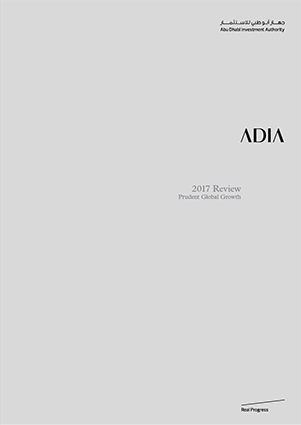Our Mission
ADIA’s mission is to sustain the long-term prosperity of Abu Dhabi by prudently growing capital through a disciplined investment process and committed people who reflect ADIA’s cultural values.
ADIA at a Glance
ADIA manages a global investment portfolio that is diversified across more than two dozen asset classes and sub-categories.
ADIA at a Glance PDF (137KB)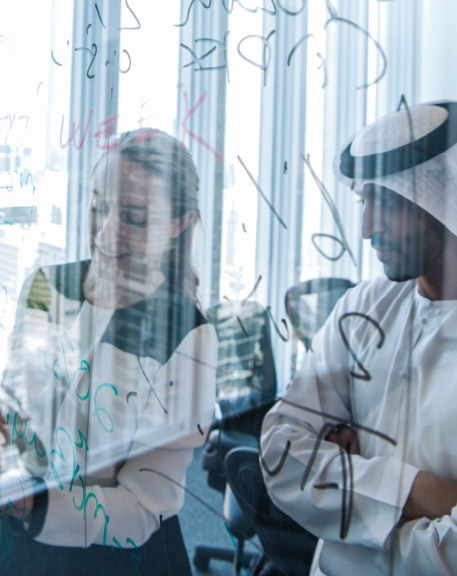
-
Employees
1,700 employees representing more than 65 nationalities
ADIA’s people are as diverse and international as our business, with more than 65 nationalities working together to create a collaborative environment that embodies our cultural values.
We strive to attract, develop and retain world-class talent, and to enable our people to realise their full potential.
- UAE 27%
- Americas 12%
- Europe 30%
- Middle East / Africa 7%
- Asia-Pacific 21%
- Australasia 3%
-
Performance
Annualised rates of return
In U.S. Dollar terms, the 20-year and 30-year annualised rates of return for the ADIA portfolio were 6.5% and 7.0% respectively, as of 31 December 2017.
Performance is measured based on underlying audited financial data and calculated on a time-weighted basis.
- 20 YRS (P.A.)
- 30 YRS (P.A.)
-
Asset Classes
Portfolio by asset class
Long‑term policy portfolio
55%
of ADIA’s assets are managed by external fund managers whose activities are subject to careful oversight by internal ADIA teams.
50%
of ADIA’s assets are invested in index- replicating strategies.
- Minimum
- Maximum
- Minimum
- Maximum
-
Regions
Long-term policy portfolio by region
*ADIA, as a matter of practice, does not invest in the UAE.Long-term policy portfolio by region
NORTH35% MIN
50% MAX
EUROPE20% MIN
35% MAX
EMERGING15% MIN
25% MAX
DEVELOPED10% MIN
20% MAX
*ADIA, as a matter of practice, does not invest in the UAE.
Hamed bin Zayed Al Nahyan
Managing Director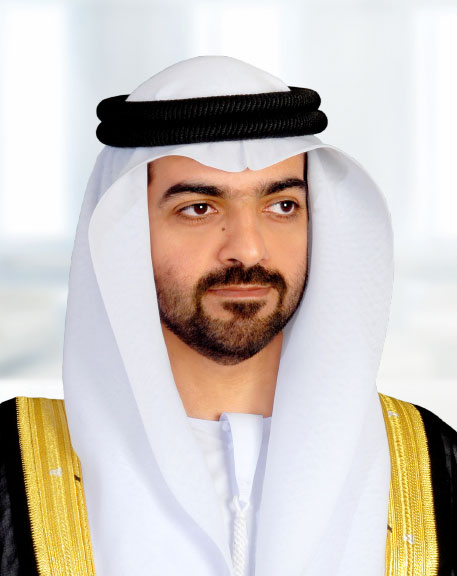
ADIA continued to evolve and refine its organisational structure and processes in 2017, in line with one of its long held beliefs: that even during periods of relative calm, the underlying factors driving global markets are always changing, and often significantly, beneath the surface.
Managing Director's Letter PDF (177KB)
Our Cultural Values
ADIA’s cultural values guide the way we work and the way decisions are made, and they are central to sustaining our investment success. They provide direction for how we think and behave as individuals and as a unified institution.
The three ADIA cultural values that we encourage all employees, individually and collectively, to demonstrate are:
Our People
ADIA’s people are as diverse and international as our business, with more than 65 nationalities working together to create a collaborative environment that embodies our cultural values.
Our goal is to attract, develop and retain world-class talent and provide the resources for our people to realise their full potential.
Managing ADIA's Talent PDF (137KB)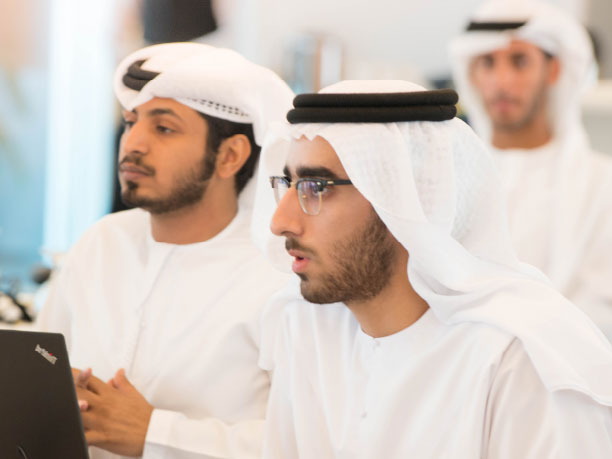
Working at ADIA
As a long-term investor, ADIA places great emphasis on analysing market trends and generating insights to make considered, deliberate and forward-looking decisions.
This institutional drive for knowledge can be seen in ADIA’s approach to investment strategy and execution, how the organisation is structured and the opportunities offered to employees to develop themselves through world-class training initiatives.
We brought together four ADIA employees from different parts of the business to discuss how ADIA’s emphasis on information, insights and knowledge helps to shape their working environment.
Key contacts at ADIA
- Noura Al Qubaisi Deputy Director, Fixed Income & Treasury
- Jean Francois Ruhashyankiko Head of Economic Analysis, Strategy & Planning
- Ahmed Al Romaithi Specialist, Human Resources
- Shabanah Choudhuri Deputy Head of Finance, Structuring and Execution, Real Estate & Infrastructure
Frequently asked questions
-
When did you join ADIA and what attracted you to the opportunity?
Noura: I joined ADIA as a fresh graduate from Zayed University in May 2008, just before the financial crisis. I knew I wanted to be in finance, so my natural instinct was to look for the best place to be in the investment universe, which, for me, was ADIA. But the second reason was honestly that the mission of ADIA is something I’m really proud of and want to be part of. It has an embedded social responsibility to contribute to future generations. I also consulted with my father at the time, and he encouraged me to join ADIA because of its reputation and history. Many of the UAE’s leaders either worked at ADIA at some point or were on one of its scholarships. So this gave me a strong feeling that ADIA was a place where there was a career path and it was possible to develop yourself.
Jean Francois: I’ve been at ADIA for just over a year now, as Head of Economic Analysis. I joined from Goldman Sachs in London, but I’ve worked in various roles in different countries, including for the IMF in Washington DC, and also in Africa, advising the government of Rwanda, my country of birth. My first reaction to the idea of joining ADIA was a positive one. It was a name that resonated well. One of the main questions I had was around why ADIA wanted to bring in an economist like me. And the answers that I got consistently were very clear: this serious commitment to constantly benchmark ADIA against best practices among the top asset managers of the world. And this was behind its decision to create a global and cross-asset research function to develop robust top-down views to support decision making.
Shabanah: I joined in 2015 from London, where I was working at GE Capital Real Estate, as Legal Counsel, advising the platform on the equity book, loan origination and restructuring. I’ve been in the legal profession for 15 years focusing on finance and real estate finance, so when the head hunter called and described the opportunity to work at ADIA in the European Real Estate Department, it was almost too good to be true. The role complemented what I was already doing at GE but with more variety. They spoke about the range of transactions, geographies, asset classes, and then explained that I would be in more of a hybrid legal / risk / commercial role – it was such a fantastic opportunity that I just couldn’t say no.
Ahmed: Well, I’m a bit of a different story I’d say. I joined at the end of April 2008 from the Environment Agency in Abu Dhabi, having graduated with a diploma from the higher colleges of technology. I was born and raised in the Western region of Abu Dhabi, which is a remote area, and I wasn’t really interested in working in a city at the time. But I had heard of ADIA, and the people around me pushed me forward to find out more and see where it would take me. After joining ADIA, I got my Bachelor’s degree in Accounting, partly because I thought I might want to move into an investment role at some point. But through my experience in the HR Department I decided that I really preferred dealing with the human part.
-
How does the experience and knowledge from such a diverse workforce contribute to ADIA’s success, and how does this benefit you in your day-to-day work?
Shabanah: This is an important point because there is a lot to learn from being around colleagues with such deep expertise, as well as different and interesting backgrounds. We have global and regional weekly meetings, so whether it’s from the CFO function or the financial, investment or research side of things, we all get together in a room and regularly meet and discuss different viewpoints.
Jean Francois: In the global research function, our mandate is exactly about that. How do we collaborate? We’ve put in place or contribute to a number of forums that bring different groups of people together. In my area of economics, we have research notes that are circulated, and regular sessions with presentations from the team that anyone can attend. And the same thing is either happening or is going to happen with the energy and political research teams.
Noura: ADIA operates global mandates, so having a diverse workforce is very important in ensuring it executes on its strategy. But diversity is also about allowing your workforce to express and dynamically debate different views and perspectives. To be good at this you need to have a culture that encourages people to work together, which is why ADIA has embedded collaboration in its cultural values. On any given day, you can hear vigorous debates on all sorts of topics, and the outcome of this is reflected in our portfolios. In Fixed Income, for example, we regularly meet to share macro and company-specific views with our colleagues in Internal Equities. I really believe that the different perspectives that each side brings to these meetings results in better decision making.
Ahmed: I think it’s clear that the diversity of experiences and backgrounds at ADIA make for a stronger workforce and better decision making. On a personal level, this is part of what makes the job so interesting and rewarding. I focus more on the human part of it, which includes recruitment and talent development, and that means I have to spend a lot of time speaking with departments and with individuals to understand their needs and capabilities.
-
ADIA has a longer investment horizon than many other financial institutions. How does that impact the way you work?
Jean Francois: My background is in sell-side research, so in the past I used to meet clients with focuses on very different investment horizons. The hedge funds were interested in what was going to happen in the next few days or weeks at most. Asset managers with large pools of capital were interested in what’s happening in the next few months, up to a year usually. Then there were the pension funds and the long-term institutional investors that have a longer-term perspective. These were the most challenging for me from an intellectual standpoint because of the need to think about major investment opportunities across asset classes and test our assumptions of what is likely to impact future generations.
Shabanah: In real estate, the long-term view is very important for us given the fact that it’s an illiquid asset, so we are very interested in market cyclicality – when we should buy, when we should sell, and when to just hold. So this pervades our everyday decision making and we ensure this big picture analysis is thoughtfully addressed in our investment papers.
Ahmed: Thinking long term is not just about investing, but also about making sure we have the right human capital. At ADIA we have an early preparation programme for UAE Nationals that starts from the 10th grade where we try to give young people an awareness of the opportunities when they are a bit older. We are also always on the lookout for promising talent. As an example, we will go to a forum in Washington DC shortly where there will be around 1,000 UAE National students studying all over the U.S. This allows us to identify students who might be strong candidates at some point in the future.
-
In your role, how do you stay connected with global trends and cutting-edge thinking?
Ahmed: I am constantly dealing with different people, both through my job in HR as well as on working groups, committees, or at conferences or courses. Technology also plays a role of course, and means we stay connected either through email or professional networking sites.
Noura: I think one of the key benefits of being here is the relationships we have with other investment houses, professionals and governments. Every year, ADIA sends delegations to different regions, as a way to learn first-hand about what’s happening in those markets, which helps us to stay connected. In my previous role, in the Internal Equities Department, I used to travel to meet the management of companies we invested in, which was important for building relationships.
Shabanah: I agree because in real estate we receive a lot of information from our fund managers, our advisers, the brokers in the market that we engage and importantly through in person meetings with counterparties and our partners. When we travel it’s not just about visiting the assets or our partners, but also research houses, brokers, and legal and tax advisors. We also have regular calls so there is a feedback loop of information between us, which makes for more productive relationships.
Jean Francois: From a geographical perspective, it’s very clear that the East has emerged and is continuing to do so. And the weight of India, China and other Asian countries in the world economy is increasingly important. So being closer to that market is a fantastic advantage, and I find the time difference also very helpful.
-
How do you feel that ADIA’s commitment to research and generating insights contributes to long-term decision making?
Jean Francois: This is the most intellectually rewarding part of the job because our focus is not on what the market will do between today and tomorrow. We can really ask ourselves the important questions, about economic growth, inflation or the role of global trade and technology. We also need to devote time to making sure our views are well articulated, because the resulting choices ADIA makes will matter for a long time.
Shabanah: The knowledge that we obtain from our research teams, and also our relationships in the market make a significant contribution to our decision making. With the creation of the Strategy and Planning Department that is going to happen more and more. We’re constantly looking at where we are in the market today and where we’ll be in five or ten years from now.
Noura: I think there is clear linkage between research and having a long-term horizon, because it gives you high conviction in your investment decisions and allows you to hold steady even if things don’t always go to plan in the short term. You can be the contrarian in the market, because you have confidence in the reasoning and the analysis that went into the decision in the first place.
Ahmed: The commitment to thorough research is important in every part of the business, including human resources, because we don’t only look into and consider the capability of the person, but also whether they are the right fit for ADIA. You might have a star who has all the capabilities but can’t work in a team. This is the puzzle we are constantly solving for. ADIA is our home and we feel a responsibility to make sure we only invite people into our home if they are going to contribute and collaborate effectively.
Shabanah: Collaboration is a big part of it. We have more than 25 different nationalities working in the Real Estate team who have this deep interest and enthusiasm for the areas they are responsible for. So for instance, our colleagues from Spain will come to us with their research and insights on the latest trends in the Spanish market and the same happens with colleagues from the Netherlands, Nordics, France or some of the other major markets around the world. They’ve got their fingers on the pulse in a way that you might not get from a market adviser.
-
ADIA has a long-standing commitment to promoting learning and development – what is your experience in this area?
Jean Francois: I think there are a wide range of choices at different levels of experience. Learning is hugely important on a personal level, but it’s also tailored to the work we do and that’s the part that I really appreciate. The other important aspect is the emphasis on sharing experience and knowledge with colleagues. For example, we have a young associate in our team and we spend time mentoring him, sometimes through hands-on coaching and, as a result, he’s doing a fantastic job and keeps on impressing every day.
Shabanah: I would say that the learning and development here has been second to none, for me personally. I’ve had the opportunity to do the management and development programme from Insead. I’ve also completed several courses that are focused more on personal development, but these have really helped in my day-to-day professional life as well, in collaborating with people from so many cultural and professional backgrounds.
Noura: I have been through the CFA programme, and some of the other recognised certifications, because these are very important at ADIA. They provide a tremendous grounding in the business of investing. I have also learned a lot from initiatives like ADIA’s Risk Academy, which looks at emerging issues related to risk and investment that may have an impact on ADIA in the future. Each module has a different theme, with case studies that are closely linked to the portfolio. So this is real-life learning, which is much more powerful than what you can get from a book.
Ahmed: Education has been at the core of ADIA since it was created. It was never just about money, but also about contributing to the development of the country and training future leaders. But also I do really agree that it’s not just the courses, or the formal training. During my time at ADIA, I have actually learned the most from my peers.
An Inside View
Two of our employees give an inside view into working at ADIA.
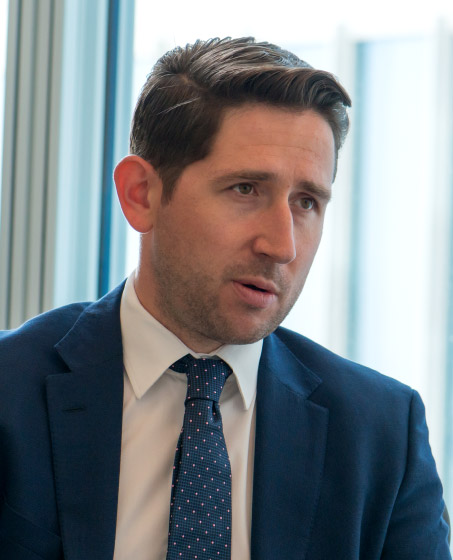
Working within ADIA we get unparalleled access to the best investors and some of the brightest minds in the financial industry, both internally and externally.
Matthew Taylor Head of Asia-Pacific,
External Equities Department
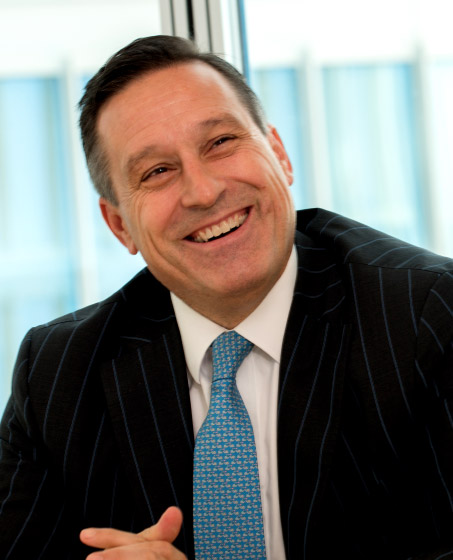
We do not view deals in isolation, based only on the specifics of that deal, but on relative terms, assessing things across markets and industries to make investments that fit within our global portfolio.
Colm Lanigan Head of Americas,
Private Equities Department
